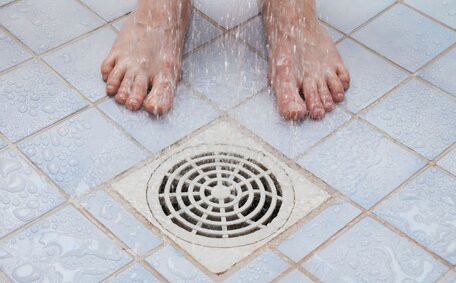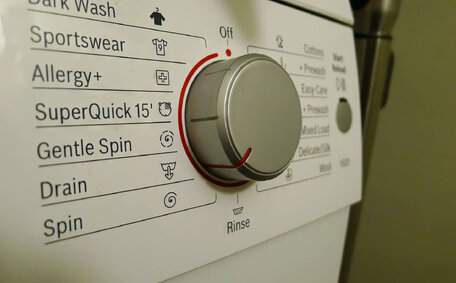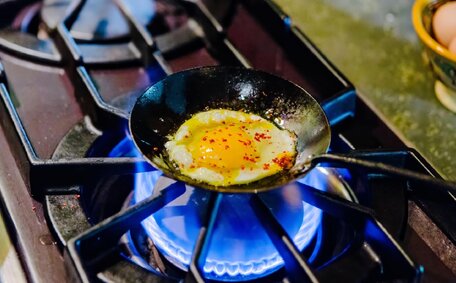
Baking Soda & Vinegar for Cleaning
Using baking soda & vinegar separately for cleaning is very effective; but mixing them dilutes their cleaning power. Learn how to use them properly.
Read MoreHard water contains high levels of minerals like calcium and magnesium. These minerals make their way into groundwater as it flows through areas with limestone, chalk, or other rock formations that are rich in these elements. The more dissolved calcium and magnesium present, the ‘harder’ the water is considered.
Water hardness is typically measured in grains per gallon (gpg) or milligrammes per litre (mg/L).
The higher these numbers, the more minerals in the water. Moderately hard water has 3–10 gpg. Moderately hard water has 3–10 gpg.
The two main sources of hard water are:
No matter the cause, hard water’s high mineral content can lead to major problems in plumbing systems over time. The limescale that builds up can reduce water pressure, clog pipes, corrode plumbing, and damage appliances that use or heat water.
The minerals in hard water can wreak havoc on plumbing systems over time. As hard water flows through pipes and appliances, the dissolved calcium and magnesium precipitate out, leaving behind scale deposits.
These limescale deposits stick to the insides of pipes, water heaters, shower heads, and any other waterusing fixture or appliance. As more and more scale builds up, it restricts water flow, reducing pressure. Scale deposits also reduce the efficiency of water heaters, making them work harder to heat water properly.
The insides of pipes become encrusted, leading to corrosion and damage. Pipe and joint connections can begin leaking. Faucets and shower heads get clogged up with scale, resulting in decreased flow or spraying water patterns.
Appliances like dishwashers, washing machines, and coffee makers that use or heat water experience scale buildup that can clog valves, tubes, and pumps. This leads to poor performance and breakdowns.
The calcium and magnesium deposits are difficult to remove once hardened on plumbing fixtures and appliances. Special descaling chemicals or mechanical removal may be required, which can be a tedious process.
Over time, hard water’s minerals accumulate to the point where plumbing systems require repairs, part replacements, or complete overhauls. The effects slowly creep up until there are major blockages, leaks, and damage.
Using water softening solutions or appliances that reduce water hardness provides protection by transforming the dissolved minerals into harmless particles that don’t stick and build up. This prevents hard water’s negative impacts and maintains plumbing system health.
Over time, the mineral deposits from hard water accumulation can severely inhibit water flow in plumbing pipes. As layer upon layer of limescale builds up along the inside walls of pipes, galvanised steel, copper, PVC, or CPVC, it restricts the opening the water can pass through.
In extreme cases, pipes can become almost completely blocked by rock-hard calcium and magnesium deposits. This leads to greatly reduced water pressure from faucets and shower heads. Taps may only drip out water or take minutes to fill a glass.
The accumulation happens slowly, so homeowners may not notice the gradual reductions in flow. But eventually it becomes difficult to use fixtures, appliances, and equipment that rely on unrestricted water access.
As scale narrows pipes, it also increases friction as water scrapes past the mineral deposits. This friction reduces flow rates further and puts additional strain on water pumps which can lead to premature failure.
Clogged pipes and plumbing fittings also increase the risk of burst pipes due to excessive water pressure buildups. In some cases, the pipes themselves corrode and spring leaks.
To restore full pressure and flow, clogged pipes need descaling. This may require hydrojetting, chemical cleaners, or complete pipe replacement in severe cases of hard water buildup.
Installing water softening systems is the best way to prevent damaging clogs and keep water flowing freely through plumbing.
The mineral deposits from hard water can lead to corrosion and damage of plumbing fixtures, pipes, and appliances over time.
As scale builds up along pipe walls and inside water heaters or boilers, the calcium and magnesium interact chemically with metal components. This leads to corrosion, pitting, and deterioration of plumbing materials.
Corrosion weakens infrastructure, causing leaks and ruptures. Appliances experience component failures and break downs more frequently due to the effects of hard water.
Faucets, shower heads, and supply valves develop mineral deposits internally that degrade o-rings, washers, and seals. Leaking and drips can result as these components wear out prematurely.
Within water heaters and boilers, flaking and corrosion accelerate damage and reduce the lifespan of the units. Tanks can start to leak and may need replacement sooner.
Using water softening or descaling solutions helps curb corrosion by transforming the minerals into a form that doesn’t damage plumbing materials or stick to surfaces.
Overall, hard water’s effects slowly compromise system integrity through corrosion. Taking preventative measures protects your plumbing infrastructure and appliances.
Hard water causes major efficiency issues for water heaters in homes. As dissolved minerals from the hard water accumulate and form scale deposits inside the tank and heating components, it reduces water flow and requires more energy to heat properly.
The scale acts as an insulating layer, forcing the water heater to work harder to maintain the temperature. More energy is required to heat water with the same mineral deposits present. This drives up energy bills.
Heating elements and other internal components corrode faster with scale buildup. This leads to breakdowns and the need for costly repairs or replacement sooner.
Descaling chemicals only provide temporary relief from hard water’s effects. Whole home water softening systems are the best solution as they transform the minerals so they don’t form scale.
Softened water allows heaters to operate at peak efficiency. Energy costs are reduced while also extending the lifespan of the appliance.
Consider installing a water softener if you notice your water heater running excessively or hot water supply is more limited. Prevent scale buildup for energy savings and trouble-free operation.
It’s easy to test for hard water in your home using simple at-home methods. Hardness test strips are the quickest way to check your water.
These test strips change colour when dipped in a water sample based on the concentration of minerals. By matching the colour to a scale, you can determine your water’s hardness level in grains per gallon or parts per million.
Testing water hardness with test strips takes seconds and costs just a few dollars. Testing water hardness with test strips takes seconds and costs just a few dollars. This involves adding a testing solution drop-wise to a water sample until it changes colour.
Water testing kits are another option that determine hardness using liquid titration.
You can also send a water sample to a lab for a full mineral analysis. While more accurate, this costs more and takes longer to get results. Using test strips or metres allows you to monitor hardness levels regularly.
Testing water at home before and after potential plumbing issues can diagnose if hard water is to blame. Periodic testing also helps determine if and when a water softener system might be needed.
Water softeners are an effective solution for preventing the negative impacts of hard water in homes. They work by removing the calcium and magnesium minerals through a process called ion exchange.
Softeners contain resin beads that are charged with sodium ions. As hard water passes through the softener, the resin beads attract and bind to the calcium and magnesium ions. The minerals are exchanged with sodium ions, transforming the minerals into harmless particles that won’t cause buildup or corrosion.
Softened water protects plumbing fixtures, extends appliance life, prevents scale on heating elements, and allows soaps and detergents to lather properly. Softeners may use timers, flow metres, or sensors to initiate the regeneration process on resin beads.
Whole home softeners are optimal for protecting the entire plumbing system. But there are also point-of-use softeners that install onto single fixtures.Maintenance involves periodically refilling salt pellets or potassium chloride and replacing filters.
Softeners require professional sizing and installation but provide lifelong protection against scale buildup. They’re a smart investment for preventing hard water damage and keeping plumbing running smoothly.
Reverse osmosis (RO) systems offer another solution for removing hard water minerals and protecting your plumbing. They use water pressure to force water through a semi-permeable membrane that filters out minerals and other contaminants.
The RO process removes over 90% of the calcium and magnesium ions that constitute hardness. The resulting purified water protects against scale buildup when used for drinking, cooking, and other household uses.
Advantages of RO systems include reduction of a wide range of impurities beyond just hard water minerals. They can remove lead, chlorine, fluoride, arsenic, and more. Many under-sink and faucet-mounted RO options are easy for homeowners to install.
Some downsides are that RO wastes 2-4 gallons of water for every purified gallon produced. The systems require regular filter replacements. And the purified water may lack healthy minerals that give drinking water taste.
For whole-home treatment, RO systems can be quite complex and costly. They may need additional water conditioning and disinfection compared to water softeners. But for drinking and cooking uses, RO effectively reduces hard water’s effects.
Hard water can cause extensive damage to plumbing systems over time if left unchecked. There comes a point when trying to resolve issues on your own is no longer effective.
Call a professional plumbing company like Lilyfield Plumbing if you experience any of the following:
Our licenced plumbers have the expertise to accurately diagnose hard water damage and restore your plumbing system to full working order. We can install water softening solutions tailored for your household’s needs.
Don’t wait until it’s too late - reach out to schedule a service appointment today. Protect your plumbing against hard water damage for the long term.
You can email us at [email protected], call 0404 410 328, or book an appointment directly through our website.
Using baking soda & vinegar separately for cleaning is very effective; but mixing them dilutes their cleaning power. Learn how to use them properly.
Read MoreBlocked drains are usually caused by buildup of hair, grease, debris and more in your pipes. Fix the problem with professional drain unblocking services to get your drains flowing freely again. Contact us for affordable drain unblocking.
Read MoreWhen you suspect a gas leak or damaged gas line, contact a licensed gas fitter immediately to locate and repair it. A gas line repair involves sealing leaks, replacing corroded or damaged pipes and testing all connections for safety before restoring gas supply.
Read MoreLilyfield, 2040 NSW
We will call back as soon as possible.




